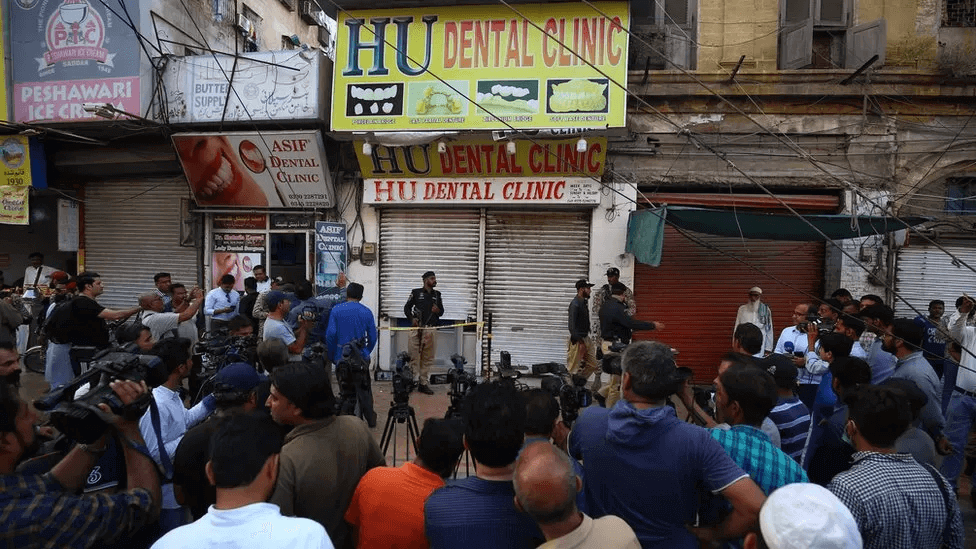Marking the latest incident in a series of attacks against Chinese nationals in Pakistan, an armed gunman posing as a dental patient killed one and injured two other Chinese-Pakistani dual nationals at a dental clinic in Karachi on Wednesday.
Senior Superintendent of the Pakistani Police Syed Asad Raza said in a statement that an unidentified man entered the private clinic in the Saddar neighbourhood at around 4 PM local time and opened fire 15-20 minutes later, killing Chinese-Pakistani employee Ronald Raymond Chou on the spot and injuring Dr. Richard Hu, 74, and Phen Teyin (also known as Margaret Hu), 72. The trio had operated the clinic in the area for over 40 years.
The injured couple was transferred to the Jinnah Postgraduate Medical Centre. The police have said they are in stable condition.
According to detectives, the attacker was in his early 30s and “didn’t hurt Pakistanis” during the incident. CCTV footage has been sought from nearby shops in the area to help identify the man, who was dressed in blue trousers, a shirt, and a red cap.
ایسے بزدلانہ اور ناقابل برداشت حملوں سے ہمالیہ سے بلند اور سمندروں سے گہری پاک چین دوستی میں دراڑیں نہیں ڈالی جاسکتیں، وزیر خارجہ بلاول بھٹو زرداری
— PPP (@MediaCellPPP) September 28, 2022
He managed to flee the scene with the help of an accomplice on a motorbike. No group or individual has claimed responsibility for the attack, and the motive remains unknown. Police have also geo-sealed the area to collect additional evidence and continue to assess whether the attacker had personal motives or committed an act of terrorism.
Raja Umer Khattab, an official from the Counter-Terrorism Department (CTD), remarked that the act appeared to be a targeted killing that had been carried out after proper reconnaissance.
“Mostly Chinese [people] who came on a visa and are affiliated with projects have been targeted in the past. But the Chinese dentist has been living in the country for the last 50 years and has become a Pakistani now,” he said. They were attacked as they were an “easy” target, Khattab noted.
Likewise, Sharjeel Memon Kharal, the deputy inspector-general of police in Karachi, said, “So far as per the initial investigation, this (dental) clinic was singled out and targeted.”
ایسے واقعات ناقابل برداشت ہیں؛ ملزمان کو جلد سے جلد گرفتار کیا جائے۔ وزیر داخلہ
— Rana Sanaullah Office (@RSK_Office) September 28, 2022
چینی باشندوں کی سکیورٹی ہرصورت یقینی بنائی جائے۔ وزیر داخلہ رانا ثناءاللہ
Interior Minister Rana Sanaullah Khan condemned the incident, saying that “Such incidents are intolerable.” He added in a tweet that “The security of Chinese residents should be ensured in every way.”
Echoing the sentiment, the country’s Foreign Minister Bilawal Bhutto Zardari called for the culprits to be brought to justice. “Such cowardly and intolerable attacks cannot create cracks in Pakistan-China friendship, which is higher than the Himalayas and deeper than the seas,” he said, demanding an investigation into the incident.
This is not the first attack on Chinese citizens in Pakistan, which China considers to be its all-weather ally.
Baloch Liberation Army releases nine minute video of Shari Baloch alias Bramsh with her message for Baloch Nation. Shari Baloch had blown herself inside Karachi University of Pakistan killing three Chinese Nationals and one Pakistani driver. pic.twitter.com/qBm1rTWYY7
— Aditya Raj Kaul (@AdityaRajKaul) April 30, 2022
In 2018, the Baloch Liberation Army (BLA) attacked the Chinese Consulate-General in Karachi. Soon after, two children of Chinese nationality were killed and three others wounded in an attack on the Gwadar port.
Then, in 2019, a luxury hotel near a China-funded project in Balochistan was attacked by gunmen, resulting in the death of eight people.
Last July, an explosion in Pakistan’s Khyber Pakhtunkhwa province caused a bus to tumble into a ravine, resulting in the death of 12 people, including nine Chinese nationals. The Chinese Foreign Ministry called for an investigation into the incident, with spokesperson Zhao Lijian urging Pakistani authorities to “severely punish” the perpetrators and “earnestly protect” Chinese citizens and projects in the country. Following the incident, the two allies agreed to broaden their counter-terrorism and security cooperation framework to safeguard Chinese projects, personnel and institutions in Pakistan.
However, the BLA bombed the University of Karachi’s Confucius Institute in April this year, killing three Chinese nationals and wounding another.
VIDEO: Deadly blast at Pakistan hotel hosting China ambassador.
— AFP News Agency (@AFP) April 22, 2021
Ambulances arrive at the scene of a blast in Quetta after a bomb exploded at a top hotel hosting the Chinese ambassador in southwestern Pakistan, killing at least four people and leaving a dozen others wounded pic.twitter.com/QG4oH7mt01
The BLA is one of the prime suspects behind the most recent attack in Karachi, given the Balochistan region’s continued dispute with the Pakistani government and its vocal disapproval of China’s multi-billion dollar Belt and Road Initiative infrastructure projects.
Pakistan has frequently deployed its military and paramilitary to Balochistan to protect Chinese projects and their workers and also crack down on the region’s independence/autonomy movement.
Balochistan residents also argue that the region does not receive its fair share of revenue from the mineral and petrochemical extraction operations in its region and that the employment opportunities generated by the China-Pakistan Economic Corridor (CPEC) are awarded to Chinese nationals. They also think that the project is imperialistic, as the influx of tourism and industrial processes into the region would reduce the ethnic dominance of the Baloch people.
CPEC projects and Chinese nationals have thus frequently come under attack. In fact, Ayman Bilal, the Major General of the Pakistani Army, admitted last year to being tasked by China to bring an end to the freedom movement in Balochistan.
China is yet to release an official statement on the latest incident.

